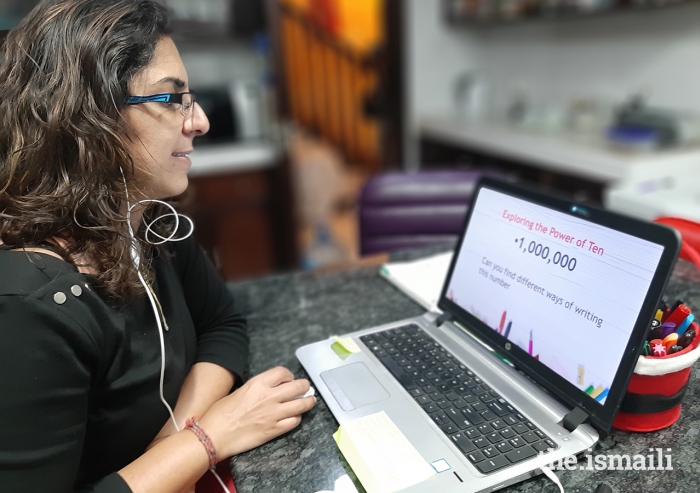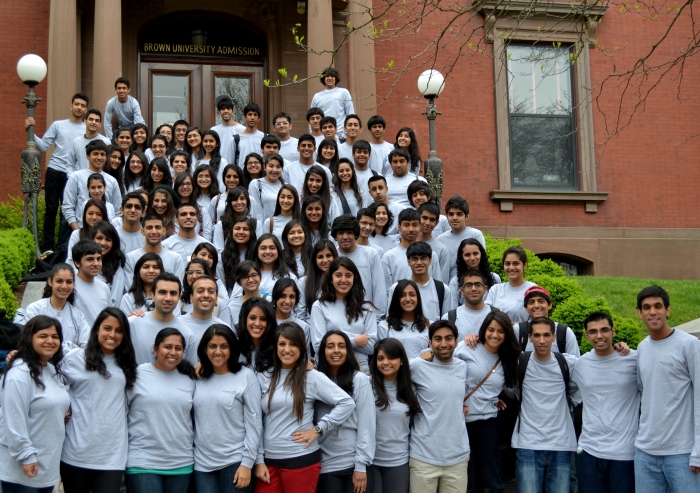 Jenny Datoo surveys farmers' associations in Pakistan's rural Soan Valley to determine the effectiveness of community participation in irrigation projects. Laya Taheri
Jenny Datoo surveys farmers' associations in Pakistan's rural Soan Valley to determine the effectiveness of community participation in irrigation projects. Laya TaheriA number of Ismaili women are courageously taking the initiative to pave the way for the empowerment of the underprivileged, of which women and girls constitute a substantial portion.
After graduating from university, Jenny Datoo rose to the rank of vice-president at a leading bank. While managing a multi-million dollar portfolio for Fortune 100 clients might be considered by some to be a “dream job”, Datoo found it less than fulfilling. She left the banking world – and the United States – to pursue a master's degree in Water Science, Policy and Management at Oxford University.
Today, Datoo works in the water management programme at the World Bank, identifying policy enhancements with governments and development institutions in Africa and Asia, and creating sustainable solutions to alleviate water challenges for millions of the world's poorest communities.
“Gender has never been a limitation in my mind,” says Datoo. “Women can have an incredibly strong influence on decision-making, whether in the household, workplace or voluntary roles.”
Women like Datoo serve as change agents by elevating the status and quality of life of those in need. By applying their own potential to a desire to make a difference, they are providing innovative opportunities that enable others to do the same.
 Sheherazade Hirji received the Hope Award from the North York Women's Shelter. The award recognises individuals who have demonstrated an outstanding commitment and record of contribution to improving the lives of women and girls. Courtesy of the North York Women's Shelter
Sheherazade Hirji received the Hope Award from the North York Women's Shelter. The award recognises individuals who have demonstrated an outstanding commitment and record of contribution to improving the lives of women and girls. Courtesy of the North York Women's ShelterLike Datoo, Sheherazade Hirji made a deliberate career change. A qualified lawyer, she chose a career path in the philanthropic sector that closely mirrored her own values. Hirji is Vice President of Client Services at Tides Canada Foundation, an organisation that supports the philanthropic passions of individuals, foundations, corporations and activists by connecting them to environmental and social justice issues that matter to them.
Hirji recognises that the sacrifices made by women in previous generations have allowed her a chance to succeed – but not all women have that opportunity. She quotes the activist and politician Rosemary Brown who said: “Until all of us have made it, none of us have made it.”
The fact that 1 out of 7 women in Canada live in poverty, 6 out of 10 of the world's poorest people are still women, and that two-thirds of all children who find themselves outside the school gates in the developing world are girls, provides strong motivation for her work.
In a previous role as an executive director at Royal LePage Shelter Foundation, Hirji focused on the issue of violence against women and supported shelters serving women and children fleeing violence across Canada. In 2008, she received the Hope Award from the North York Women's Shelter in recognition of her outstanding commitment and record of contribution to improving the lives of women and girls. As a board member of the Canadian Women's Foundation and a member of the National Committee of Aga Khan Foundation Canada, Hirji is a powerful voice for women and girls, as well as issues of gender in development.
 Shaherose Charania (left) works with two entrepreneurs on an idea at Women 2.0 Labs, a pre-incubator for future technology founders. Angie Chang
Shaherose Charania (left) works with two entrepreneurs on an idea at Women 2.0 Labs, a pre-incubator for future technology founders. Angie ChangWhen asked what constitutes a woman of substance, Hirji states that it is “someone who is grounded in her values and has a sense of perspective as to what really matters in life.”
Shaherose Charania fits that definition well. Although she grew up in Canada, frequent family trips to Pakistan opened her eyes to economic inequality around the world. She is the co-founder and CEO of Women 2.0, an organisation devoted to women's empowerment.
“I realised how important technology was in connecting people and changing the status quo of a country, a city and an individual's mind,” says Charania, who is based in San Francisco.
While working in Silicon Valley, Charania noted an obvious gender imbalance among the technology start-up community. She discovered that although more than half of all small businesses are run by women, only 5 per cent of women are founders of high tech enterprises. This meant that women were being left behind in innovation, and missing out on the opportunity to make a difference in the world of technology. Charania started Women 2.0 to help fix this disparity.
 Dr Sunera Thobani is an Associate Professor of Women's Studies at the University of British Columbia. Fatima Jaffer
Dr Sunera Thobani is an Associate Professor of Women's Studies at the University of British Columbia. Fatima Jaffer“Our goal is to increase the size of the entrepreneurship funnel by introducing more female founders into the early stage pipeline,” she says. A visionary at heart, Charania is reaching tens of thousands of women and has personally seen 300 projects get off the ground.
Datoo, Hirji and Charania are trail-blazing women, but Dr Sunera Thobani wonders how many recognise the significance of what they and other women like them have accomplished. The Associate Professor of Women's Studies at the University of British Columbia, laments that today's women generally know very little of their gender's history.
“One of my major goals is to reach young women and to teach them about women's activism, historically,” says Dr Thobani. For her, women's empowerment is about “creating real material options for women to end poverty and violence in their lives.” As a Muslim woman and scholar, Dr. Thobani is at the forefront of educating people about Islam and its values. She challenges women to achieve more and sets the record straight on the stereotypes surrounding Muslim women.
“It is very important for young women to think critically, to feel the power that women have and to join forces with those who want a world based on justice.”







